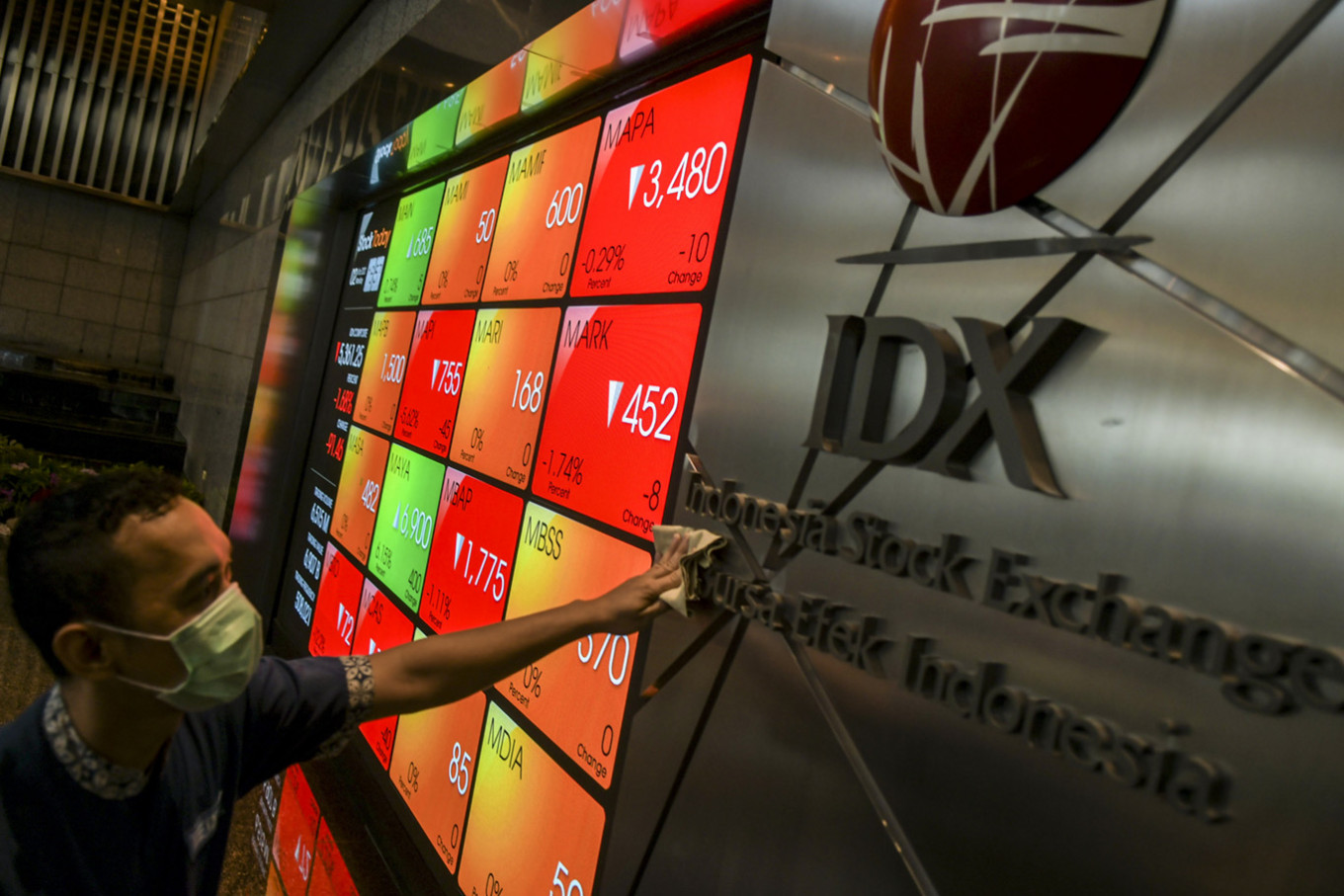Popular Reads
Top Results
Can't find what you're looking for?
View all search resultsPopular Reads
Top Results
Can't find what you're looking for?
View all search resultsIndonesian stocks, rupiah surge in recent weeks despite weak economic outlook
The recent gain in Indonesia’s financial markets occurred as the economy is likely to slow further than expected this year.
Change text size
Gift Premium Articles
to Anyone
I
ndonesian stocks and the rupiah exchange rate have soared in recent weeks as foreign investors flock to Indonesian assets and bet on a financial market recovery despite a bleak domestic economic outlook.
The Jakarta Composite Index (JCI), the main gauge of the Indonesia Stock Exchange (IDX), jumped 2.48 percent on Monday to 5,069 points in line with its Asian peers, which booked increases following upbeat United States employment data. However, the index slipped 0.7 percent on Tuesday, with foreign investors buying Rp 275.01 billion (US$19.52 million) worth of stocks more than they sold.
It has rallied by 8.75 percent in the last 30 days until Tuesday, after crashing by 16.76 percent in March only, IDX data showed. So far this year, the JCI has lost more than 20 percent of its value.
Meanwhile, the rupiah exchange rate stood at 13,890 per US dollar on Tuesday, gaining around 5 percent since May 28 and 16.2 percent since March 23 when the currency fell to its lowest level since the 1998 Asian financial crisis. The rupiah, therefore, is back to its value prior to the COVID-19 crisis.
The recent gains in Indonesia’s financial markets occurred as the economy was likely to slow further than expected this year. The World Bank in its Global Economic Prospect report published on Monday expected Indonesia’s economy to record zero percent growth this year from 5.1 percent projected in January.
The government has estimated this year’s growth to reach 2.3 percent under the baseline scenario and even contract 0.4 percent in the worst-case scenario. The country’s first-quarter growth stood at 2.97 percent, the lowest in 19 years and below the government and the central bank’s expectations of around 4 percent.
“While Indonesia’s economy will struggle this year, investors remain confident of the potential the country offers in terms of market size and growth,” said Fitch Solutions head of Asia country risk Anwita Basu, adding that efforts made by the central bank had stabilized financial markets.
“Bank Indonesia has deployed multiple lines of defense against the rupiah’s weakness that has restored investors’ confidence in rupiah-denominated assets,” she told The Jakarta Post in an email correspondence on Monday.
“Furthermore, if Indonesia continues the reform path, the country will likely benefit from supply chain diversification many companies are considering as a lesson drawn from the COVID-19 pandemic and overreliance on China.”
Bank Indonesia (BI) decided to hold its benchmark interest rate at 4.5 percent in May despite room for easing as it worked to safeguard the rupiah exchange rate’s stability. The central bank has also bought up to Rp 166 trillion in government bonds in the secondary market during the first quarter of 2020 to stabilize the rupiah and another Rp 26.1 trillion to support budget financing needs, boosting the central bank’s ownership of government bonds to Rp 445.4 trillion.
The rallies in Indonesian stocks and currency also supported foreign investors’ rising appetite for risky assets following the easing of COVID-19 restrictions in several countries, spurring hopes of a global economic recovery.
Foreign investors bought Rp 8 trillion in Indonesian stocks throughout last month, Financial Services Authority (OJK) data show. However, they still recorded a net sell of Rp 7.56 trillion so far this year, according to IDX data.
Indonesia’s sovereign debt market also saw an influx of foreign money last month as the OJK recorded a net foreign buy of Rp 7.07 trillion in May.
“There is a gap between market rally and reality as investors bet heavily on economic recovery,” Mirae Asset Sekuritas Indonesia economist Anthony Kevin told the Post. “The current stock market rally is prone to correction as it does not reflect economic fundamentals.”
The COVID-19 pandemic, which has upended the job market and choked the cash flows of micro, small and medium businesses (MSMEs), may not justify the current market rally, said Anthony.
“In stark contrast, the surge of foreign inflow into the debt market is justified, thanks to low inflation and a stronger rupiah.”
The central bank reported Rp 18.67 trillion in net inflows, mainly in sovereign debt papers, from the second week of May to the first week of June. From April 1 to May 14, BI recorded $4.1 billion in net inflows.










